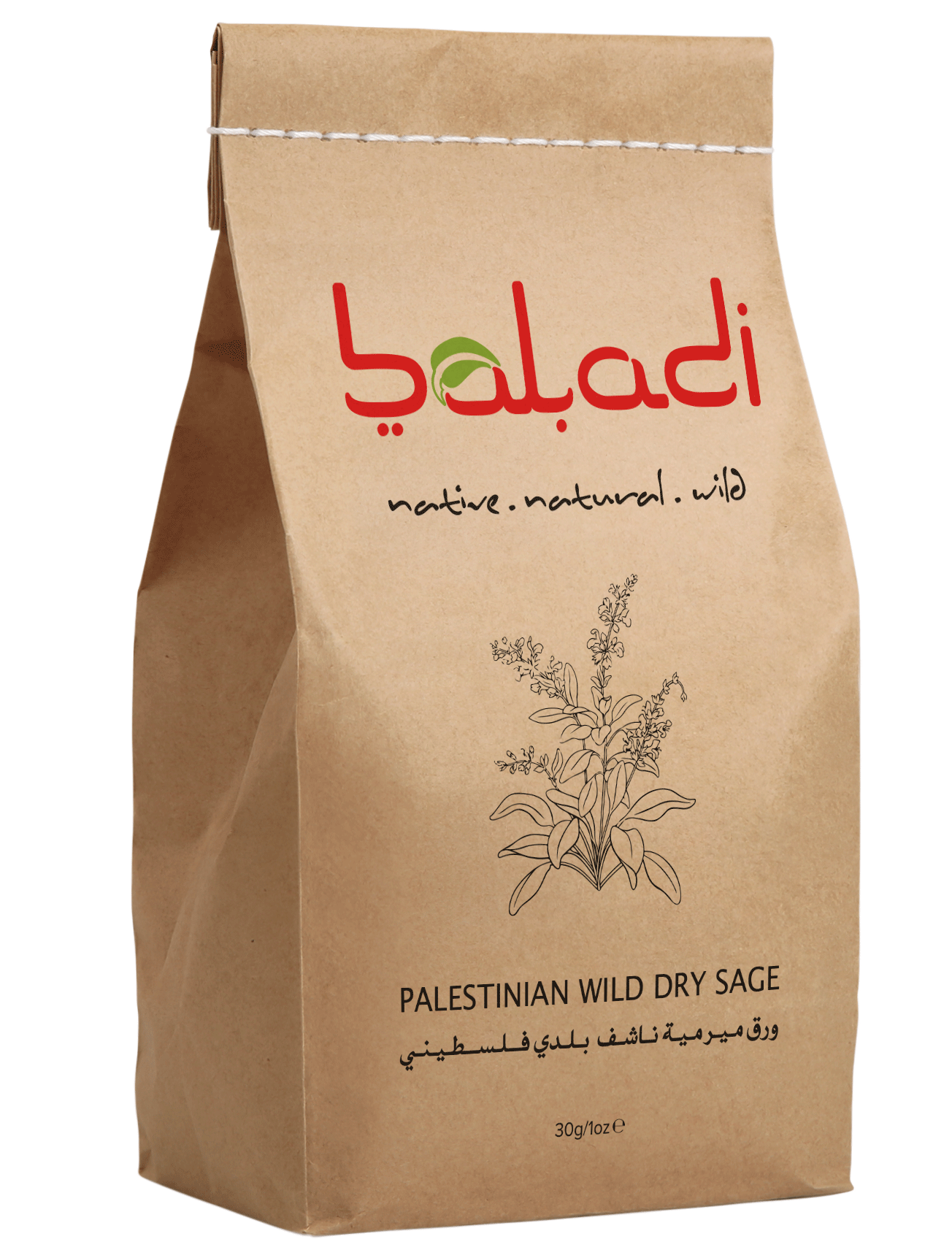-
Your shopping cart is empty!
Sage

Scientific Name : Salvia Officinalis
Common Name : Common Sage, Garden Sage, Kitchen Sage, Dalmatian Sage
Arabic Name : مَريمِيّة, Mayramiya
Plant Family : Labiatae / Lamiaceae,
For thousands of years, sage has been used by herbalists externally to treat sprains, swelling, ulcers, and bleeding. Internally, a tea made from sage leaves has had a long history of use to treat sore throats and coughs. In Palestine there is almost not a single house without the wildly growing care free sage shrubs growing and multiplying in the yards. Just like most wild plants here in Palestine, this variety requires almost no care and can grow just about anywhere with full resistance to pets and diseases. Locally, the sage is also used as rub and marinade for many ingredients especially poultry.
Health benefits of Sage
Boosts Cognition
The research included in the Journal of Clinical Pharmacy and Therapeutics has shown that even small amounts of sage extracts, whether inhaled or consumed, can help relieve symptoms of mild to moderate Alzheimer’s disease and increase recall abilities and memory retention in people. [3] The brain activity also demonstrates increased concentration and focus on a chosen topic.
Treats Inflammation
A study in the Journal of Ethnopharmacology, claims that sage has the ability to treat many topical diseases that arise out of inflammation.
Chewing on sage leaves is not always the most pleasant remedy, as the flavor can be quite intense, but this is the most effective way to get the organic compounds acting in your system. Creating a tincture or steeping the leaves – a sage brew helps relieve inflammation of respiratory or gastrointestinal tracts, you can eliminate that inflammation with this sage brew. The anti-inflammatory effects on issues such as arthritis and gout, and general inflammation of the cardiovascular system. More recently, studies have indicated that sage may have beneficial anti-inflammatory effects in the realm of dentistry.
Antioxidant Properties
Chronic conditions and degenerative diseases can be some of the most debilitating and dangerous health concerns that you face in your life. Many of these are caused by free radicals, the dangerous by-products of cellular metabolism that attack healthy cells, causing apoptosis or mutation. According to a study in the Agricultural and Food Chemistry journal, the antioxidant compounds found in sage – such as rosmarinic acid, luteolin, and apigenin, can work to neutralize free radicals and prevent them from creating oxidative stress in the heart, organ systems, skin, joints, muscles, and even the brain.
Strengthens Immunity
While the herb is usually consumed in small quantities, you can create a topical application of sage (salve or tincture) and use it to reduce or prevent bacterial and viral infections that attack the body through the skin. We often think of illness entering through our nose or mouth, but the skin can also be compromised and be used as a gateway for foreign agents. A topical cream or antibacterial routine that includes sage could be an extra line of defense against that sort of illness vector.
Oral Health
A randomized controlled clinical trial published [8] in the Iranian Journal Of Microbiology concluded that sage extract mouth rinse exerted antibacterial action against Streptococcus mutans in dental plaque. Moreover, sage mouth rinse can also be used as a supplement for conventional methods of plaque control against dental cavities.
Improves Bone Health
Menopausal Care
The findings of the study published in the International Journal of Medical Research & Health Sciences showed that extracts of sage significantly reduce the frequency, severity, and duration of hot flashes and night sweats. Hence, it improved the menopausal symptoms in menopausal women. Conclusively, this safe and effective herb is a remedial cure for the treatment of menopausal symptoms.
Skin Care
A topical salve or a tincture of the plant can be created using sage leaves, which has been shown to be effective against certain skin conditions, including eczema, psoriasis, and acne. These unsightly blemishes can be quickly soothed and their appearance can be reduced gradually if you regularly apply sage extracts and salves to the inflamed or affected areas.
Manages Diabetes
Aids in Digestion
Rosmarinic acid, found in sage, is thought to act as an anti-inflammatory agent for the stomach, preventing gastric spasms and reducing the occurrence of diarrhea and gastritis. Adding it to your meals may get your entire digestive process back on track and reduce inflammation throughout the gut.
Manages Cholesterol
In a pilot trial, it was observed that there was an improvement in lipid profile with lower plasma LDL cholesterol and total cholesterol levels as well as higher plasma HDL cholesterol levels during and two weeks after treatment.